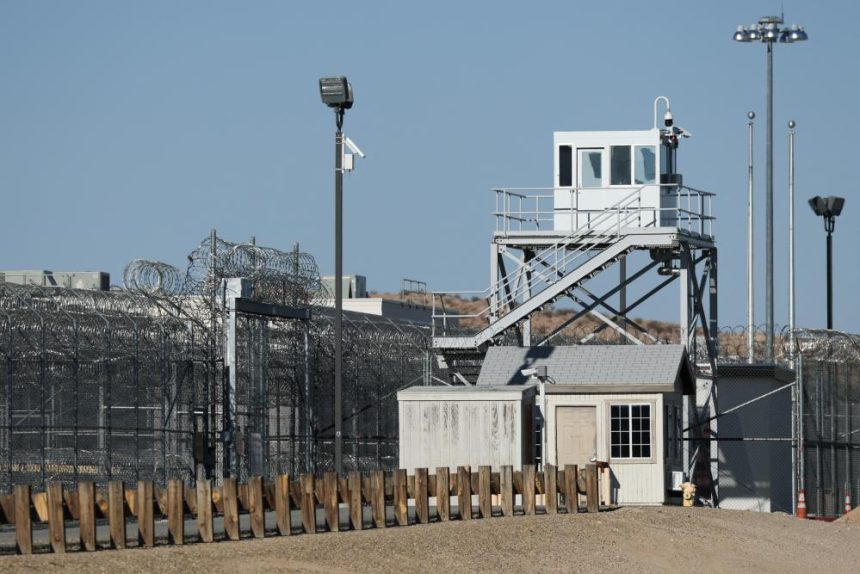Immigrants locked up in California’s newest federal detention center have described the facility as a “a torture chamber”, “a zoo” and “hell on earth”, saying they were confined in filthy cells and suffered medical crises without help.
Six people detained at the California City detention center, which opened in late August and is now the state’s largest Immigration and Customs Enforcement (Ice) detention center, shared accounts with the Guardian of poor conditions and alleged mistreatment by staff.
The detention center is located in a desert region 100 miles (160km) north-east of Los Angeles, on the grounds of a state prison that closed in March 2024. CoreCivic, the private prison corporation, re-opened the facility as an Ice detention center as the Trump administration has pushed to rapidly expand immigration detention capacity. Advocates argued the process was rushed, and city officials said CoreCivic is operating the facility unlawfully without the required permits.
Related: Ice detainees death toll reaches 16 amid concerns over ‘horrendous’ conditions
The detainees, who are fighting deportation, said they have struggled to access hygiene and cleaning supplies, and lack adequate food and medications, and that officers have threatened solitary confinement and physical force over minor issues or after they spoke up.
“This place is built to break us,” said Sokhean Keo, a California City detainee who is facing deportation to Cambodia and refused to eat for several days last week to protest conditions. “There is nothing but harassment and torture here. It’s inhumane, unsanitary and a health hazard every single day … Please, please help us, please.”
In interviews over the last two weeks, California City detainees have claimed:
-
staff were not consistently giving people daily medications, and some detainees fell unconscious due to health issues;
-
some toilets and sinks were backed up or not functioning properly, creating a stench;
-
detainees were left to clean their own cells, but not given proper supplies;
-
detainees were confined to cells for hours, and when they were allowed outdoors, it was sometimes only for 30 minutes a day in a dusty area with nothing to do;
-
small food portions left people hungry, with some saying they rationed meals and feared the water they were drinking was dirty.
Brian Todd, a CoreCivic spokesperson, said in an email that CoreCivic’s on-site healthcare team “takes seriously their role and responsibility to provide high-quality healthcare, available 24/7”, and that initial delays in providing medications after people transferred to the facility have been resolved. He said toilets “are maintained in proper working condition”. He also said the company had “submitted all required information for the business license and continues to maintain open lines of communication with city officials”.
‘Officers weren’t ready’
As part of the dramatic surge in immigration enforcement, the Trump administration has allotted $45bn to increase the capacity of Ice detention centers – with the ultimate goal of holding more than 100,000 people. Already, the number of detainees has hit record highs this summer.
Part of that plan involves boosting capacity in places like California City – and quickly.
CoreCivic, which operates dozens of prisons and detention facilities across the US, reached a $13.5m agreement with Ice in April to convert what was previously a 2,560-bed prison in California City.
The detention facility is situated in a remote, sprawling town in the Mojave desert that experiences scorching-hot summers and cold winters. More than 500 detainees were housed there as of early September, according to the local mayor who visited, and the site has increased Ice’s detention capacity in California by 36%.
Oversight of Ice detention centers has generally been limited, so often lawyers and families rely on the accounts of detained residents and government officials who do get tours.
Detainees brought to California City in recent weeks said they had been abruptly transferred from other Ice facilities in the state and that staff seemed ill-prepared for the influx.
“Some officers expressed they weren’t ready for the population to come in,” said Alfredo Parada Calderon, who has been in Ice detention for nearly two years and is facing deportation to El Salvador. “It’s a major mess. They didn’t have nothing to give us.”
Parada said he initially received just one set of socks and underwear and wore the same clothes for nearly a week while washing undergarments in his sink. A small soap bar supposed to last a week was insufficient, he said. His cell was freezing cold, with bedding not thick enough to keep him warm, and lights were on 24/7, making sleeping difficult, he said.
Food was served cold and portions were small, so at times he would save a piece of bread for later: “People go hungry in here,” he said.
Fernando, another detainee, who asked to go by a nickname out of fear of retaliation from staff and Ice, said that even when he saved all three daily meals to eat at once, it barely fit one plate: “The servings are just enough to keep us from starving.”
Oscar, a detainee who asked not to use his full name because he also fears retaliation, said one officer told the detainees to drink unfiltered sink water that appeared cloudy and dirty: “This place has been shut down. Who knows what is in the pipes? She was so persistent, this is the water you get.” Eventually, he said, the officer brought them different water in jugs, though he feared that water was also dirty.
Would you let your own family live in these conditions? It’s irresponsible. It’s unkind
Alfredo Parada Calderon, California City detainee
Ice facilities typically have law libraries and some books available, but California City has no reading materials or resources for people working on their cases, Parada added.
Jon, a detainee who requested to go by a pseudonym out of fear of retaliation, said when he arrived, the toilet in his cell was filled with feces and other toilets weren’t working. “Everything is dirty,” he said. He said he cleaned his cell using his own soap, shampoo and towel, and at one point detainees were given two buckets of water, two brooms and mops and told to clean a dorm housing roughly 90 people.
“Would you let your own family live in these conditions?” Parada said. “It’s unethical. It’s irresponsible. It’s unkind.”
Todd, the CoreCivic spokesperson, said “any claim of water quality issues is patently false”, saying residents get the same water supply provided to the surrounding community. When detainees arrive, the facility provides “clean clothing”, toiletries including soap and shampoo, and blankets and “staff will reissue supplies and clothing as needed”, he said. Todd added that detainees have access to law library computers in their housing areas.
‘Like military bootcamp’
In addition to the lack of supplies and dirty conditions, detainees described cruel and humiliating behavior by some staff members.
Some officers were running the site as if it were a correctional facility and treating residents like criminals, even though they are accused only of civil immigration violations, said Parada: “We have to keep reminding them that we are detainees, not prisoners. We are civilians. They treat us like a bunch of animals.”
“The treatment is very unprofessional and military-like,” added Oscar, who said some staff appeared to be training on the job due to the rushed opening: “They shout: ‘Get in your cells! Lockup! Count time! Walk in a single-file line!’ It’s very aggressive, like we’re in a military bootcamp.”
Detainees said staff frequently did seven “counts” a day, where residents are required to return to their cells so officers can count them one-by-one. The procedure can leave residents locked up for hours. Parada said there were days when he spent 20 hours in his cell.
Keo recounted one incident where several men were exercising in a common area, since there is minimal outdoor time and no recreational or exercise equipment. The men took off their shirts in the heat, which can climb above 100F (37.7C) in the region, prompting an officer to order them to put their shirts on. When the men objected, the officer threatened to pepper-spray them, place them on lockdown for days or send them to “the hole”, referring to solitary confinement, he said: “They like to power trip and show their authority.”
Jon said he they first arrived, staff threw out many of the detainees’ personal belongings and conducted aggressive searches that involved touching their genitals. “They said: ‘Get your hands on the wall and spread your legs,’” he recalled. “People were saying: ‘Why are you touching me and holding onto my thing?’ And they said: ‘It’s procedure. If you don’t like it, too bad.’”
During a lengthy intake process, Jon said, detainees had to raise their hands if they needed to use the bathroom: “It was so degrading.”
He also said he witnessed an older detainee ask an officer if he could have an extra tray of food that was sitting uneaten. The staffer said no and threw it away in front of him, he recalled: “I think that’s evil.”
Jon and Keo both said staff photographed their tattoos and questioned them about possible gang ties, and threatened them with “the hole” if they didn’t comply with questioning.
Todd, of CoreCivic, said staff receive six weeks of training, which “includes preparing for and responding to critical incidents”, and that “many” have previous experience “working in secure facilities”. He did not comment on the alleged incidents outlined by the detained residents, but said when detainees are transferred from other facilities, open commissary items are thrown out.
‘They’re going to let me die in here’
Detainees said poor healthcare was their most urgent concern.
One asylum seeker inside California City, who requested anonymity due to fear of retribution, said he has been in Ice detention for more than a year and has been awaiting surgery for months. He said he can barely walk, and after he was transferred from another facility to California City, his requests for a wheelchair were repeatedly ignored.
“The day we got transferred was a disaster,” he said. “Many times, I requested a wheelchair and medical care. They just kept saying you have to walk. I was in pain. Nobody listened to me. Nobody cares. As the days pass, my health condition is getting worse.”
When I don’t get my medication, my heart starts beating really fast … I feel like I’m dying
Sokhean Keo, California City detainee
Several detainees said there were delays in getting medications, and Oscar said staff did not seem to communicate with their previous facilities about their prescriptions. Keo said staff threw away detainees’ medications during their transfers to California City, and staff have regularly delivered pills at strange hours of the night – sometimes after midnight.
Keo said he had also witnessed two people collapse and need emergency care, leading to cries of “man down!” from detainees and guards.
Keo said he required anxiety medication but was not given it at consistent times, and couldn’t ingest them in the middle of the night without food: “When I don’t get it, my heart starts beating really fast, my whole body starts sweating. It’s like I’m about to have a heart attack. I feel like I’m dying.” He was worried about people in the facility with diabetes not consistently getting their insulin.
Fernando said he takes psychiatric medications that help him sleep, but staff have at times delivered it at 3am. He also said he had been waiting more than two weeks to be seen by a doctor for thyroid issues and went three days without medications. While speaking by phone to an advocate, a nurse passed by, but did not answer his questions about when he would get the care he was requesting. “She refused to tell me anything and walked away,” he said, adding that he feared he would not receive proper treatment. “They’re just going to let me die in here.”
Fernando said he saw a detainee who appeared to have mental health issues banging on his door but not getting help. The detainee later attempted suicide and became unconscious, he said.
Todd, of CoreCivic, confirmed there was a suicide attempt on 9 September, and that the detainee was hospitalized. He said the healthcare team follows medical care standards established by the company and government partners; that residents have “daily access” to sign up for care, including mental health services; and that prescribed medications are either managed by healthcare staff “or by the individuals themselves”. Nurses “promptly inform the ordering physician when renewals are required”, he continued, adding that no recent hospital visits were due to residents not receiving prescribed medications.
“All our facilities operate with a significant amount of oversight and accountability, including being monitored by federal officials on a daily basis, to ensure an appropriate standard of living and care for every individual,” he said.
An Ice spokesperson declined to comment, referring the Guardian to CoreCivic.
‘Disregarding the law’
Immigrants’ rights groups have fought to shutter the California City detention center since its opening.
Marquette Hawkins, California City mayor, said on Thursday that CoreCivic did not have the proper permits or business license to operate the facility and that its application is still pending. The city, he said, was exploring options to address the violations, including possible fines. He said the city did not get notice from the company that detainees were moving in, which he learned from advocates: “I was a little bit taken aback and disappointed.”
Grisel Ruiz, senior managing attorney with the Immigrant Legal Resource Center, a non-profit, said that in addition to its lack of permits and license, CoreCivic had also bypassed state law requiring that the city provide an opportunity for public input and advanced notice before opening a new Ice detention facility: “For them to totally disregard local municipal law and state law should alarm everybody.”
Anti-Ice protesters began gathering outside the facility when news spread of its opening and recent city council meetings have been packed with residents from across the region objecting to the detention center, the San Francisco Chronicle reported.
Related: Ice puts more than 10,000 people in solitary in a year – and figures are rising under Trump
Hawkins said he believes local residents “see the benefit to any industry being here providing jobs”. He toured the facility for roughly two hours in early September and said it appeared clean and that staff were “operating with a high level of professionalism”. He said he saw one person on suicide watch and another on a gurney being treated for a medical issue.
The California Collaborative for Immigrant Justice (CCIJ), a group supporting detainees, said last Thursday that more than 100 detainees had taken steps to protest their alleged mistreatment, including organizing sit-ins and hunger strikes. Officers responded with lockdowns, which restricted telephone access, sent some people to solitary confinement and, in at least one area, threatened force, CCIJ said.
Todd contested the use of the term “solitary confinement” and said that when CoreCivic isolates residents, it places them in what it calls “restrictive housing units”. Last Thursday, Todd said, a group of detainees “briefly refused to comply with a directive to return to their living areas”, but “subsequently chose to return to their cells without the need for further action”. Seven of them were placed in restrictive units “pending an investigation”, he said.
Detained people were protesting and risking retaliation because they are desperate for intervention, said Priya Arvind Patel, CCIJ supervising attorney: “People are sick and really, really scared something bad is going to happen, and no one is going to care.”
Some detainees said they were, for the first time, considering accepting deportation.
“I just want a fair chance to stay here and fight my case,” said Keo. “My family wants me to stay, but I’m tired … I think of quitting every single day I’m here. In my country, it’s bad right now, very bad. But there is nothing worse than this. This place is hell on earth and we need to get out.”









